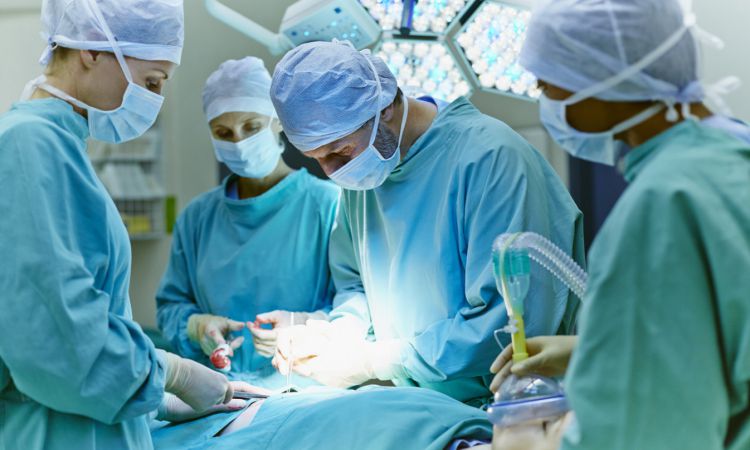 The experience of getting a surgical procedure done can be stress-inducing – even if it is in an outpatient setting of removing a wart. Different surgeries require monitoring and evaluation of various parameters. For example, it is crucial to check kidney function tests before starting cardiac surgery. But you need not worry about all the lab work, since your medical professional will run several tests before you are deemed fit for the surgical procedure – no matter how big or small. But here is how you can feel more in control of the situation and naturally do things to make the process easier:
The experience of getting a surgical procedure done can be stress-inducing – even if it is in an outpatient setting of removing a wart. Different surgeries require monitoring and evaluation of various parameters. For example, it is crucial to check kidney function tests before starting cardiac surgery. But you need not worry about all the lab work, since your medical professional will run several tests before you are deemed fit for the surgical procedure – no matter how big or small. But here is how you can feel more in control of the situation and naturally do things to make the process easier:
Soak Up the Sun and Get Your Vitamin Levels Checked
Balanced nutrition shall prevent longer hospital stays and complications. Since different vitamins play a huge part in regulating normal body function, you must correct any deficiencies. Vitamin D, C, K, and B (including its subgroups) are more important. Vitamin D prevents fractures; especially in old age after a lengthy surgical procedure. Vitamin K and C prevent excessive bleeding. Vitamin B improves overall functionality by increasing DNA synthesis and better cell turnover as well as increasing iron absorption from the gut.
Cleanse Your Gut
Many gram-negative species reside in the gut and due to any change in normal physiology they can colonize and grow. One of the main reasons for this bacterial growth is that obstructed food and remnants become good for the bacteria which breed and release toxic substances and gases. Surgeons usually recommend that you do not take any meal six to eight hours before the procedure to cleanse the gut of any toxic substances and gas. Nutrition is supplemented parenteral. Drinking detox juices that increase the rate of peristalsis can help flush the bacteria thus decreasing the chances of secondary infection.
Correct Your Circadian Rhythm
Having fixed sleeping and waking up times will regulate the levels of cortisol and melatonin better. Thus, allowing you to sleep and wake up normally post-surgery. This will also prevent spikes in cortisol, the stress hormone, during surgery especially if it is scheduled in the evening or the afternoon – since cortisol levels start depleting during this time of the day.
Do Light Exercise if Possible
Exercise is great for reducing stress, releasing the body’s natural opioids and endorphins, and for better cardiovascular health. Sudden strenuous exercise is not recommended for a beginner but light exercises such as jogging, walking or swimming will help open up capillaries for better oxygenation and transport of nutrition to the deeper layers of the body.
Resort to Preoperative Training Exercises
If your mobility is restricted, which happens in many orthopedic surgeries, you can carry out preoperative training exercises from the comfort of your bed. This involves exercises like spirometry which helps increase lung capacity and clears the air sacs from potentially infectious agents. Seek your physiotherapist’s advice for preoperative exercises that are better suited to your condition.
Increase Zinc and Vitamin C in Your Diet for Boosting Immunity
Increase zinc and vitamin C to combat oxidants and boost immunity. Citrus fruits are rich in vitamin C, whole wheat products, seafood, nuts, and eggs are great sources of Zinc. Open surgical procedures increase the chances of bacteria’s entry into your system. Although the strong antibiotic cover is given by the surgeons, boosting immunity will reap longer and stronger benefits.
Consume Healthy, Fresh, and Homemade Food
One of the ways bacteria may enter your gut is through the ingestion of stale foods cooked and stored in unhygienic conditions. Stir clear from takeaways or processed foods. The latter causes inflammation and sets the ground for frequent infectious insults. Thus, consume fresh fruits and homemade food cooked in vegetable oil without refined sugars to avoid inflammation and the increased production of reactive oxygen species.
Maintain Good Oral and Physical Hygiene
Many bacteria reside in our mouth and skin. Practicing good hygiene will prevent the growth and colonization of these bacteria post-surgery when your immune system is relatively weaker and you’re prone to hospital-acquired infection as well. Practice good oral hygiene by flowing, gargling, and brushing your teeth twice a day. Wash your hands for twenty seconds before eating anything. If mobility is an issue, keep a family member or a nurse around for help. The lesser amount of bacteria in your surrounding, the lesser chances of getting infected when the immunity has been compromised.
Stay Hydrated
With the inevitable fluid loss during surgery, you must keep up your hydration to mitigate any losses. Increase the intake of fresh fruit and vegetable juices and water. This will also enhance your kidney function by improving urine output and shall detoxify your body of excess urea and creatinine.




